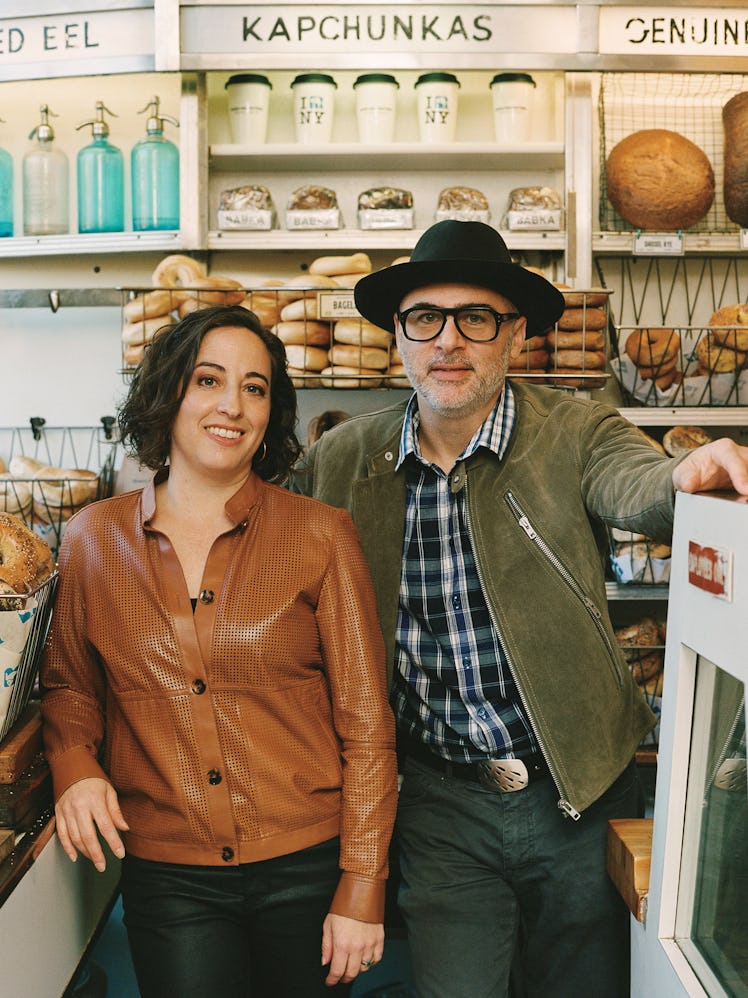You’re cousins and the fourth-generation co-owners of Russ & Daughters, a New York institution known for supplying the city’s finest lox, caviar, bagels, and bialys, among other Jewish staples. The original store, on East Houston Street, has been open since 1914. Now you have multiple locations, plus a cookbook and a scripted television series on the horizon. What does originality mean to you?
Josh Russ Tupper: For us, originality is staying true to who we are and what we do. These days, originality is nearly impossible—it’s cobbling together influences. But as owners of a 109-year-old business, we find it easier to maintain our traditions, which can be considered “the originals.”
Niki Russ Federman: Originality, to me, is about letting things evolve and take on the patina of life. A Yiddish word we use a lot is “haimish.” It means something that is real, unpretentious, homey, comfortable. There’s a little bit of grit. It’s our job to maintain the haimish-ness of Russ & Daughters.
How do you continue evolving your family’s business while paying homage to your predecessors?
JRT: Niki and I took ownership 12 years ago. At the time, it was one store run as a small family business.
NRF: It was literally mom-and-pop because it was my mom and pop. For 100 years, there was just the shop. We have since opened two restaurants, our own bakery, a nationwide shipping facility, and an outpost in Brooklyn. We’re working on a new location in Hudson Yards.
Old-school New York establishments are having a fashion moment. How do you feel about that?
NRF: We don’t look around at what’s trendy. Our two merch campaigns that blew up during Covid-19 were, again, born out of something very organic. The idea for the tie-dye T-shirt we did with Jake Gyllenhaal had been floating around for a while, because Jake had a one-of-a-kind tie-dye Russ & Daughters shirt. Jake’s a friend, so we never felt comfortable talking to him about it. But during Covid, people were looking for ways to help, and the idea came back as a way that we could raise money for restaurants impacted by the pandemic. We sold 4,000 shirts in a month and raised $92,000. We did a second campaign with a hoodie to help theater workers.
JRT: It’s fun to mess around with design. We have a sneaker collaboration with Extra Butter coming out this winter to celebrate the 50th anniversary of Puma’s Clyde shoe. Their shop is two doors down from our café on Orchard Street.
What would people be surprised to learn about Russ & Daughters? Are there any common misconceptions?
JRT: We’re not a deli; we’re an appetizing store. A deli sells meat. An appetizing store sells smoked and cured fish and dairy. Appetizing is born of the kosher tradition where you can’t eat dairy with meat. I want to put “not a deli” on a T-shirt.
How do you celebrate your family’s history?
NRF: We hope that when you’re in Russ & Daughters and you’re eating our food, it’s a confluence of the past and the present in one moment. Some people have said that coming to Russ & Daughters is, for them, their synagogue. It’s how they express their Jewish identity. We’ve opened that up in lots of interesting ways. We do a seder at the café on the second night of Passover, which has become one of these “only in New York”–type nights. Anyone can come; you don’t have to be Jewish. Every year, we have different artists and musicians perform, like Laurie Anderson, Suzanne Vega, and Elvis Costello. During Hanukkah, we think about people who have been special to Russ & Daughters, and each night, we invite one of them to light a candle on the menorah.
Who made you realize you could break the rules or do things differently?
NRF: Lou Reed and his wife, Laurie Anderson, have been magical people in my life. I met Lou at a potluck-style loft party where I brought a smoked fish platter. I saw him put down his plate and come charging toward me. He said, “I’m so excited to meet you. You’re New York royalty,” and he immediately started telling stories about his childhood and what Russ & Daughters meant to him. At the time, I was very conflicted about the business—it didn’t feel like it was my choice, and I was kind of fighting it and wanting to get out. What impacted me was seeing how the food and the place and the meaning of Russ & Daughters could transport people back in time to where they came from. I recently had a conversation with some friends of Lou’s. They said that Lou told them before he died that one of his crowning achievements was playing some part in my decision to come back to Russ & Daughters. I was like, “You’re joking, right?” And they said, “No, he was very serious. He understood what made New York New York. He was very proud that he might have helped to sway you in some way.”
Hair by Walton Nunez for Moroccan Oil at SEE Management; Makeup by Amanda Wilson for MAC Cosmetics at OPUS Beauty. Photo assistant: Romek Rasenas.
This article was originally published on
